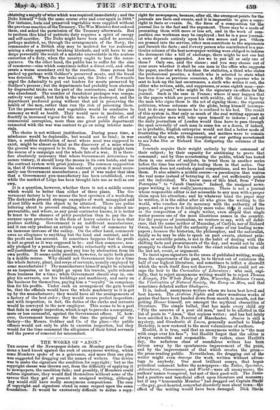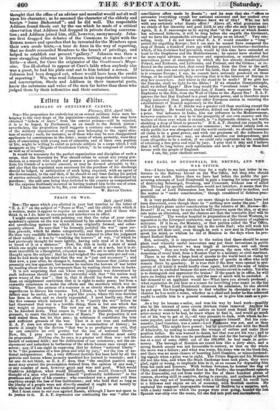THE WORKS OF "ANON."
THE course of the Newspaper debate on Monday gave the Com- mons a hard knock against the rook of anonymous writing, which some Members spoke of as a grievance, and more than one plan was suggested for dragging out the names of writers. One device was to make the signature the condition for copyright : but as the copyright clause was thrown out, from the difficulty of applying it to newspapers, the condition fails ; and possibly, if Members could enforce signature, they would find themselves without some of the savour that they get at present in unsigned writing, although hey would still have really anonymous compositions. The case a copyright and signature stand in some respect upon the same foundation. It- would be excessively difficult to define a copy- right for newspapers, because, after all, the strongest points for the journals are facts and events, and it is impossible to give a copy- right in facts or events. So, the force of a composition for the journal lies in the fact and the argument. There may be a mode of presenting them with more or less art, and in the work of com- position one workman may be employed ; but be is a poor journal- ist who depends entirely upon his own senses and pen. Others are pressed into the service, other men contribute to the arguments and furnish the facts ; and if every person who contributed to a par- ticular column of the best newspaper-writing were obliged to indorse the document like a bill of exchange, there might be not one but a score of names appended. Are we to put all or only ono of these P Only one, said the clause ; and you may choose out of your score whether it shall be one man in the office who suggestts the paper, another who furnishes the statistics, a third who states the professional practice, a fourth who is selected to state what has been done on previous occasions, a fifth the reporter who is sent to look-up the last occurrences, a sixth who writes it out, the editor who revises, adds, and suppresses, or some eighth man—per- haps the " &ant," who might be the signatary ex-officio for the journal. Such is the case in France ; where it may happen that in the papers which are perused with avidity, all that is done by the man who signs them is the act of signing them ; the vigorous politician, whose columns stir the globe, being himself incompe- tent to do any more because he is confined to his bed. The result of this system is, that only so much of the real writing appears as that particular man will take upon himself to indorse ; and all the daily journalism of London would thus have to pass through the span severally of each man in some ten or a dozen, if indeed, as is probable, English enterprise would not find a better mode a frustrating the whole arrangement, and matters were to remain exactly as they are, with the exception of our getting accustomed to see John Doe or Richard Roe disfiguring the columns of the Times.
Journals acquire their weight entirely by their command of their subject; by their capacity for continuing to prove that command; and by thus accustoming the public, which has tested them in one series of subjects, to trust them in another series before the time has arrived for testing them in that series. Our journalism does not exclude signed compositions, and we have had them. It also admits a middle course—a pseudonym that waives the real name instead of betraying it, and yet sufficiently pointa out the individual. We know eases of this kind, from "Peter Porcupine " to "Jacob Omnium." Indeed, the unsigned newt- paper writing is not really:anonymous. There is not a' journal whose responsible editor is not accessible to any man with a proper claim upon his attention; and by whatever hand the paper may be written, it is the editor after all who gives the writing to the world, who vouches for its accuracy with the enthor4y of the paper, and so gives to it infinitely more value thip it could have as the composition of a single writer, even shopld that single writer possess one of the most illustrious names in the country. For the purpose of journalism, we venture to say, with all defer- ence, that the name neither of Macaulay, of Carlyle, nor of Richard Owen, would have half the authority of some of our leading news- papers ; because the historian, the philosopher, and the naturalist, finally as he may be able to speak on past events, abstract prin- ciples, or scientific points, is not in the habit of dealing with the shifting facts and presentments of the day, and would not be able promptly to classify for his reader the exact relation and value of the last act, event, or argument.
To insist upon signature in the cases of published writing, would, from the experiences of the past, be to thrust out of existence the half of our highest literature, and sometimes to inflict a discredit which the work itself does not deserve. This point could not es- cape the heir to the Curiosities of Literature; who said, capis tally, that to reject anonymous writing would be to reject Thomas d Kempis, The Whole Duty of Man, Waverley, Robinson Crusoe, the Vindication of Natural Society, the Essay on Man, and that sometimes debated author Shakspere.
It is, indeed, anonymous writers whom we have best loved and best known. The Arabian Nights and other wondrous works of
genius that have been handed down from mouth to mouth, not for- getting Homer himself, are amongst the mythical obscurities of literature. The simple ballad, that has made every child cry
"Pity the sorrows of a poor old man," used to be allotted in the list of poets to "Anon," that copious writer; and has but lately been ascribed to a Dr. Percival of Manchester. Junius is still a mystery, and Gaudentio di Lucca, generally ascribed to Bishop Berkeley, is now restored to the most voluminous of authors. Hazlitt, it is true, said that an anonymous writer is "the man with crape over his face"; but Ilazlitt forgot that the editor is always ostensible and responsible. Or rather, since Ilazlitt's day, the nefarious class of scandalous writers has been driven away by the spontaneous improvement of the press, and by the improvement of that which creates the press— the press-reading public. Nevertheless, the drsaing out of the writer might even damage the work written without advan- tage to anybody. Our most brilliant Ways, that began periodical comment before the newspapers—the Tatter, Spectator, Adventurer, Connoisseur, and World—were all anonymous; the authors' names transpired, but not of their good-wilL The Taller had a positive and beneficial effect upon literature and manners; but if any "honourable Member" had dragged out Captain Steele —the gay, good-hearted, somewhat disorderly man about town—the effect of the writing would have been _damaged. Dick Steele thought that the office of an adviser and moralist would not sit well upon his character; so he assumed the character of the elderly and benign "Isaac Ilickerstaff"; and he did well. The respectable Addison found Steele out . by the use which he made of a critical observation that Addison had dropped in private during conversa- tion; and Addison joined him, still, however, anonymously. John- son first dragged the debates of the Commons to light with the Ionian names and speeches that he invented for the Members upon their own crude hints,—a tour de force in the way of reporting, that no doubt reconciled Members to the breach of privilege, and helped to establish our present "gallery." Johnson was then a or struggling debutant in literature, writing at so much—or so little—a sheet, for Cave the originator of the Gentleman's Maga- zine. Too ill-clothed to appear at Cave's table when anybody else was a guest, he had his plate sent out to him behind a screen. If Johnson had been dragged out, where would have been the credit at reporting ? We, who read Johnson in his imperishable volumes and conversation, Steele and Addison in their immortal parts, know the substance and value of the men far better than those who judged them by their infirmities and their costumes.



































 Previous page
Previous page